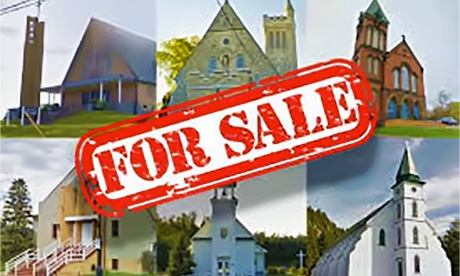In a pastoral message released in December, Cardinal Gerald Lacroix of the Archdiocese of Quebec announced a dramatic transformation in how the Catholic Church in the province should understand itself.
Faced with declining resources and a faithful but increasingly small cohort of weekly Mass attendees—between 2 and 11 percent of the province, according to The Economist in 2016—Cardinal Lacroix called on the church in Quebec not to struggle to hold on to what it has left but to see itself as a mission church moving outward.
“We must reorient our pastoral teams toward a more intensely missionary activity, turned toward the people and groups that we join too little,” the cardinal said.
“Cardinal Lacroix’s decision is fully in tune with what the Quebec bishops have called the missionary turnabout, following Francis’s ‘Joy of the Gospel,’” said Frédéric Barriault, a researcher at the Jesuit-run Center for Justice and Faith in Montreal, in an email.
“For years, there were too many churches and too few priests and faithful to tend them.
“They needed to dispose of many of these ageing and sometimes crumbling churches to kickstart the real church, the one that is not made of concrete, brick and mortar, but of flesh, blood and faith.
“They needed to dispose of these aging churches to kickstart the real church, the one not made of brick and mortar, but of flesh, blood and faith.”
In recent years, hundreds of churches in Quebec have been slated for demolition or conversions into mixed-use facilities—homes, theatres and more—reflecting the waning presence of institutional Catholicism.
The number of baptisms in the province has sharply declined.
The economic effects of the Covid-19 pandemic have exacerbated the budget challenges of already struggling parishes.
Still, 64 percent of people in Quebec identify as Catholic, according to the polling firm Angus Reid, even if weekly Mass attendance is no longer the norm.
Barriault suggests that out of such challenges may emerge new expressions of authentic Catholicism in the province. “It means less parochial churches, priests and Sunday Masses,” he said, “and more smaller meeting rooms where laypersons would animate the liturgy of the Word and be a sign of God’s love for humanity by their personal and collective [action] for the common good.”
It is an opportunity “to become the ‘field hospital church’ that Francis so often speaks about.”
While the missionary direction may be new, Barriault insists that the church has a long tradition of engaging people in Quebec, especially through efforts in pursuit of social justice.
To help explore that tradition, the Center for Justice and Faith has been compiling stories and information about past social justice campaigns by Catholics in Quebec in an online archival project, “Mémoire du christianisme social au Québec.”
Young people in Quebec, according to Barriault, born after the Second Vatican Council and the so-called Quiet Revolution, when civic institutions in the province experienced rapid secularization, have never known the ultramontane and Tridentine church of the past.
They are “rediscovering the prophetic heritage of Catholic social activists involved in labour, feminist, ecological and decolonial struggles,” he said.
“The church would be wise to tap into that vein, with the hopes and dreams of Quebec’s youth.”
The church in Quebec also has a rich, living tradition of missionaries to draw upon, including those who have wrestled with what it means to preach the Gospel under the province’s unique conditions.
Among them is the Rev. Claude Lacaille, who worked as a missionary with the Société des Missions-Étrangères in some of the most difficult political contexts in Haiti, Ecuador and Chile.
Though he had to navigate dictatorships and violence abroad, he says his return to Quebec in 1986, after the province had secularized, “was my most difficult mission of all.”
Lacaille left Quebec for Haiti in 1965, when most Quebeckers were still practising Catholics.
He adapted himself well in foreign countries, he said.
His memoir, Rebel Priest in the Time of Tyrants, is full of stories of enculturation, throwing in with the struggle of others, living alongside other missionaries like the Maryknoll Sisters Ita Ford and Carla Piette.
“But when I came back to Quebec, secularism was something that I was not confronted with before,” he says.
“In Chile, I was working all the time in my environment with communists, atheists and so on. There was never a problem that I was a priest. ‘He’s on our side,’ they would say.”
But “to be a priest in Quebec was a problem. That was difficult for me because I was surprised; I didn’t know what to do.” Continue reading
